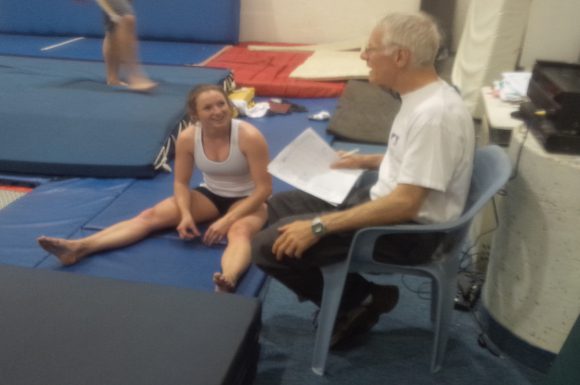Many students miss class once in a while during their undergrad education, but Rosie MacLennan skipped a lot.
Her classmates didn’t know it at the time as she had yet to make a name for herself at the Olympics — the 2008 Summer Games in Beijing were her first — but MacLennan was absent so often because she was training.
It was just a matter of time of course, and after she won her gold medal in trampoline at the 2012 Summer Games in London – Canada’s only gold medal at those Games – the secret came out.
“I try and keep a fairly anonymous profile at school just because it’s school,” says MacLennan, who is now pursuing a Master’s in Exercise Science at the University of Toronto.
“But one of the first classes I walked in to, my supervisor for my Master’s, the home screen of my faculty was a picture of me, so she pulled it up and people in my class looked at the screen, then looked at me.”
It’s been just over a year since MacLennan won her medal, though it’s only a few months since the media storm around her died down.
“In Rosie’s case, the media went apes— over her because she’s smart, humble, blonde, and young and smiles a lot, so they all wanted to interview her and she got a lot of time sucked out of her life for the six months after the Olympics,” says Dave Ross, founder of Skyriders Trampoline Place, where MacLennan trains.
“It usually only lasts a few weeks for most athletes and then it’s just the depression rather than the media that sucks the time out of your life. Every athlete’s different, but Rosie had a lot of her time taken up by appearances.”
Coaches do feel emotionally drained after an Olympics, says Ross, but the cycle is different for them. They have other athletes to train and other duties as well.
If an athlete fails to make an Olympics, the time leading up to it is their down time. If they compete in it, win or lose, there is an inevitable loss of motivation afterwards.
“‘What am I training for? Qualifying meet? The Ontario qualifying meet? That’s not enough of a thrill to even get me to blink,’” says Ross, all the while keeping an eye on his students. “And it’s months away.
“And they know they can come out in the top two in Ontario without training, so there’s no immediate pressure or incentive.”
MacLennan took two months off after London, and as expected, had a tough time coming back. When you don’t train for that long, your body forgets a little.
Unfortunately, a couple months after her return to training an ankle injury knocked her out again and she was gone for another three months.
“It was, I don’t want to say a blessing in disguise, obviously it sucks to be injured, but at the same time, it was that final thing holding me back and getting that fire back was helpful,” says MacLennan. “Now I’m really motivated going into the next three years.”

